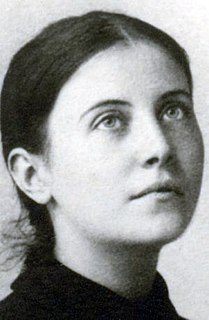A Quote by John Stott
If the first mark of a true and living church is love, the second is
suffering. The one is naturally consequent on the other. A
willingness to suffer proves the genuineness of love.
Related Quotes
To love is to suffer. To avoid suffering one must not love. But then one suffers from not loving. Therefore, to love is to suffer; not to love is to suffer; to suffer is to suffer. To be happy is to love. To be happy, then, is to suffer, but suffering makes one unhappy. Therefore, to be happy one must love or love to suffer or suffer from too much happiness.
At some point, we have each said through our tears, “I’m suffering for a love that’s not worth it.” We suffer because we feel we are giving more than we receive. We suffer because our love is going unrecognized. We suffer because we are unable to impose our own rules. But ultimately there is no good reason for our suffering, for in every love lies the seed of our growth.
Understanding and Love are not two separate things, but just one. To develop understanding, you have to practice looking at all living beings with the eyes of compassion. When you understand, you cannot help but love. And when you love, you naturally act in a way that can relieve the suffering of people.
The problem for most of us is that the cup has holes, so love goes out just as easily as it goes in. What happens when people are living in the unconditional state of love, however, is that they recognize they are the ocean of love; they know it's their essence. And they naturally overflow in this love. So instead of being love beggars, they become love philanthropists.
True love, like any other strong and addicting drug, is boring — once the tale of encounter and discovery is told, kisses quickly grow stale and caresses tiresome… except, of course, to those who share the kisses, who give and take the caresses while every sound and color of the world seems to deepen and brighten around them. As with any other strong drug, true first love is really only interesting to those who have become its prisoners. And, as is true of any other strong and addicting drug, true first love is dangerous.































